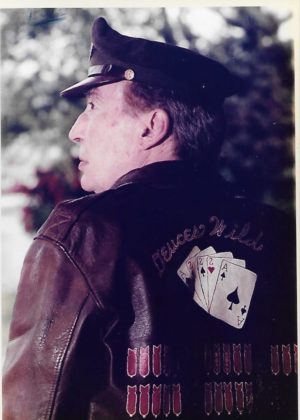Martin Atkin, retired USAF pilot, wearing his B-17 bomber jacket, 1994

Image and biography provided by Hillary Atkin
Martin Atkin was a captain in the U.S. Army Air Forces, 8th Air Force division. He was 18 ½ years old when he enlisted in the armed services the day after Pearl Harbor was attacked on December 7, 1941. After a series of rigorous tests, he was accepted into Aviation Cadets and trained to be a pilot for 15 months at bases in the Southern and Eastern United States.
Within a few days of being transferred to the 8th Air Force base in England, he was piloting a B-17 aircraft with a crew of ten, bombing oil refineries, rail lines and other key supply routes in Nazi Germany as part of Allied attempts to halt Hitler’s war efforts. He and his crew were also part of the massive D-Day invasion of Normandy on June 6, 1944.
At the outset of what would be 25 bombing missions, he faced anti-Semitism from a crew member. As they were walking to the aircraft to take their positions, a fellow serviceman on the crew with a thick Southern accent asked him in a derogatory manner, “Are you a Jew?” To which the New York City-born Capt. Atkin replied, “See these hands? These are Jewish hands. And your life is in these hands.” End of story, end of anti-Semitism in that unit.
The B-17 crew accomplished all 25 missions although on the last one, the aircraft was hit by heavy Nazi antiaircraft fire over Germany and Capt. Atkin was seriously injured, but his copilot was able to safely fly the plane back to their base in England. From there, Capt. Atkin was evacuated back to the United States where he spent four years recovering from his injuries at Walter Reed Military Hospital in Bethesda, MD.
He was called upon by the State of Israel to help fight in the 1948 War of Independence, and was regretful his injuries prevented him from doing so. He was later awarded a Purple Heart in ceremonies at the White House. Capt. Atkin went on to live a long and productive life, remaining always proud of his service to his country.
Extensive first-hand accounts of Capt. Atkin’s war experiences can be heard in the Library of Congress’s Veterans History Project, for which he was interviewed in 2004.
http://memory.loc.gov/diglib/vhp/story/loc.natlib.afc2001001.18481/